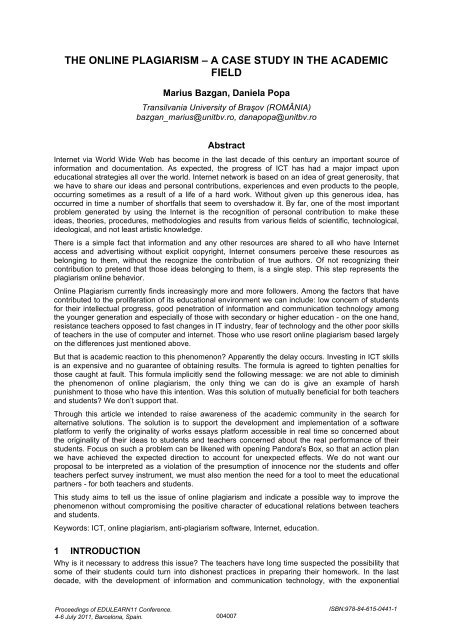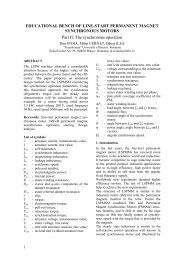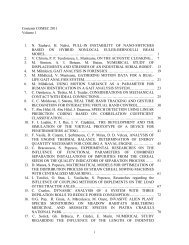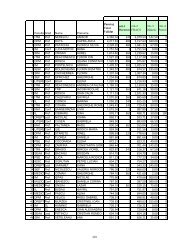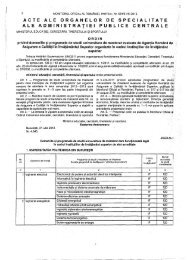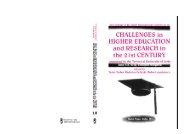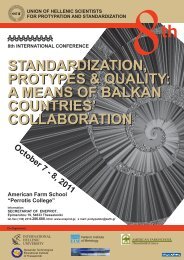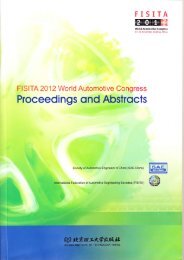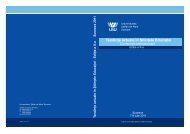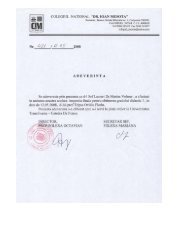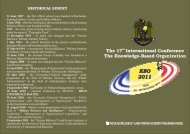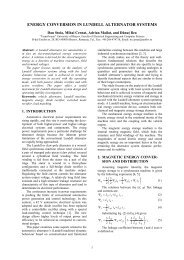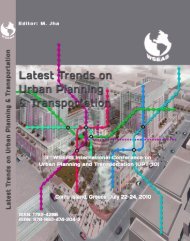EDULEARN11 Proceedings CD (ISBN: 978-84-615-0441-1) - Portal
EDULEARN11 Proceedings CD (ISBN: 978-84-615-0441-1) - Portal
EDULEARN11 Proceedings CD (ISBN: 978-84-615-0441-1) - Portal
Create successful ePaper yourself
Turn your PDF publications into a flip-book with our unique Google optimized e-Paper software.
THE ONLINE PLAGIARISM – A CASE STUDY IN THE ACADEMIC<br />
FIELD<br />
Marius Bazgan, Daniela Popa<br />
Transilvania University of Braşov (ROMÂNIA)<br />
bazgan_marius@unitbv.ro, danapopa@unitbv.ro<br />
Abstract<br />
Internet via World Wide Web has become in the last decade of this century an important source of<br />
information and documentation. As expected, the progress of ICT has had a major impact upon<br />
educational strategies all over the world. Internet network is based on an idea of great generosity, that<br />
we have to share our ideas and personal contributions, experiences and even products to the people,<br />
occurring sometimes as a result of a life of a hard work. Without given up this generous idea, has<br />
occurred in time a number of shortfalls that seem to overshadow it. By far, one of the most important<br />
problem generated by using the Internet is the recognition of personal contribution to make these<br />
ideas, theories, procedures, methodologies and results from various fields of scientific, technological,<br />
ideological, and not least artistic knowledge.<br />
There is a simple fact that information and any other resources are shared to all who have Internet<br />
access and advertising without explicit copyright, Internet consumers perceive these resources as<br />
belonging to them, without the recognize the contribution of true authors. Of not recognizing their<br />
contribution to pretend that those ideas belonging to them, is a single step. This step represents the<br />
plagiarism online behavior.<br />
Online Plagiarism currently finds increasingly more and more followers. Among the factors that have<br />
contributed to the proliferation of its educational environment we can include: low concern of students<br />
for their intellectual progress, good penetration of information and communication technology among<br />
the younger generation and especially of those with secondary or higher education - on the one hand,<br />
resistance teachers opposed to fast changes in IT industry, fear of technology and the other poor skills<br />
of teachers in the use of computer and internet. Those who use resort online plagiarism based largely<br />
on the differences just mentioned above.<br />
But that is academic reaction to this phenomenon Apparently the delay occurs. Investing in ICT skills<br />
is an expensive and no guarantee of obtaining results. The formula is agreed to tighten penalties for<br />
those caught at fault. This formula implicitly send the following message: we are not able to diminish<br />
the phenomenon of online plagiarism, the only thing we can do is give an example of harsh<br />
punishment to those who have this intention. Was this solution of mutually beneficial for both teachers<br />
and students We don’t support that.<br />
Through this article we intended to raise awareness of the academic community in the search for<br />
alternative solutions. The solution is to support the development and implementation of a software<br />
platform to verify the originality of works essays platform accessible in real time so concerned about<br />
the originality of their ideas to students and teachers concerned about the real performance of their<br />
students. Focus on such a problem can be likened with opening Pandora's Box, so that an action plan<br />
we have achieved the expected direction to account for unexpected effects. We do not want our<br />
proposal to be interpreted as a violation of the presumption of innocence nor the students and offer<br />
teachers perfect survey instrument, we must also mention the need for a tool to meet the educational<br />
partners - for both teachers and students.<br />
This study aims to tell us the issue of online plagiarism and indicate a possible way to improve the<br />
phenomenon without compromising the positive character of educational relations between teachers<br />
and students.<br />
Keywords: ICT, online plagiarism, anti-plagiarism software, Internet, education.<br />
1 INTRODUCTION<br />
Why is it necessary to address this issue The teachers have long time suspected the possibility that<br />
some of their students could turn into dishonest practices in preparing their homework. In the last<br />
decade, with the development of information and communication technology, with the exponential<br />
<strong>Proceedings</strong> of <strong>EDULEARN11</strong> Conference.<br />
4-6 July 2011, Barcelona, Spain.<br />
004007<br />
<strong>ISBN</strong>:<strong>978</strong>-<strong>84</strong>-<strong>615</strong>-<strong>0441</strong>-1


